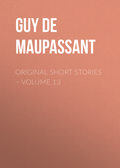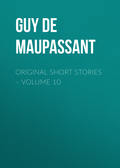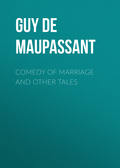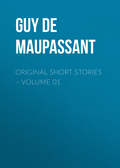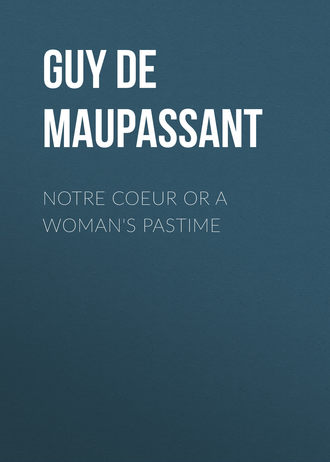
Ги де Мопассан
Notre Coeur or A Woman's Pastime
The abbé was watching his son with terrified eyes; he had stopped eating.
Philippe-Auguste was preparing to begin. "No, not yet," said the priest, "in a little while."
And he turned to strike the Chinese gong.
Marguerite appeared almost instantly. Her master addressed her in such a rough tone that she hung her head, thoroughly frightened and obedient: "Bring in the lamp and the dessert, and then do not appear until I summon you."
She went out and returned with a porcelain lamp covered with a green shade, and bringing also a large piece of cheese and some fruit.
After she had gone, the abbé turned resolutely to his son.
"Now I am ready to hear you."
Philippe-Auguste calmly filled his plate with dessert and poured wine into his glass. The second bottle was nearly empty, though the priest had not touched it.
His mouth and tongue, thick with food and wine, the man stuttered: "Well, now for the last job. And it's a good one. I was home again, – stayed there in spite of them, because they feared me, – yes, feared me. Ah! you can't fool with me, you know, – I'll do anything, when I'm roused. They lived together on and off. The old man had two residences. One official, for the senator, the other clandestine, for the lover. Still, he lived more in the latter than in the former, as he could not get along without mother. Mother was a sharp one – she knew how to hold a man! She had taken him body and soul, and kept him to the last! Well, I had come back and I kept them down by fright. I am resourceful at times – nobody can match me for sharpness and for strength, too – I'm afraid of no one. Well, mother got sick and the old man took her to a fine place in the country, near Meulan, situated in a park as big as a wood. She lasted about eighteen months, as I told you. Then we felt the end to be near. He came from Paris every day – he was very miserable – really.
"One morning they chatted a long time, over an hour, I think, and I could not imagine what they were talking about. Suddenly mother called me in and said:
"'I am going to die, and there is something I want to tell you beforehand, in spite of the Count's advice.' In speaking of him she always said 'the Count.' 'It is the name of your father, who is alive.' I had asked her this more than fifty times – more than fifty times – my father's name – more than fifty times – and she always refused to tell. I think I even beat her one day to make her talk, but it was of no use. Then, to get rid of me, she told me that you had died penniless, that you were worthless and that she had made a mistake in her youth, an innocent girl's mistake. She lied so well, I really believed you had died.
"Finally she said: 'It is your father's name.'
"The old man, who was sitting in an armchair, repeated three times, like this: 'You do wrong, you do wrong, you do wrong, Rosette.'
"Mother sat up in bed. I can see her now, with her flushed cheeks and shining eyes; she loved me, in spite of everything; and she said: 'Then you do something for him, Philippe!' In speaking to him she called him 'Philippe' and me 'Auguste.'
"He began to shout like a madman: 'Do something for that loafer – that blackguard, that convict? never!'
"And he continued to call me names, as if he had done nothing else all his life but collect them.
"I was angry, but mother told me to hold my tongue, and she resumed: 'Then you must want him to starve, for you know that I leave no money.'
"Without being deterred, he continued: 'Rosette, I have given you thirty-five thousand francs a year for thirty years, – that makes more than a million. I have enabled you to live like a wealthy, a beloved, and I may say, a happy woman. I owe nothing to that fellow, who has spoiled our late years, and he will not get a cent from me. It is useless to insist. Tell him the name of his father, if you wish. I am sorry, but I wash my hands of him.'
"Then mother turned toward me. I thought: 'Good! now I'm going to find my real father – if he has money, I'm saved.'
"She went on: 'Your father, the Baron de Vilbois, is to-day the Abbé Vilbois, curé of Garandou, near Toulon. He was my lover before I left him for the Count!'
"And she told me all, excepting that she had deceived you about her pregnancy. But women, you know, never tell the whole truth."
Sneeringly, unconsciously, he was revealing the depths of his foul nature. With beaming face he raised the glass to his lips and continued:
"Mother died two days – two days later. We followed her remains to the grave, he and I – say – wasn't it funny? – he and I – and three servants – that was all. He cried like a calf – we were side by side – we looked like father and son.
"Then he went back to the house alone. I was thinking to myself: 'I'll have to clear out now and without a penny, too.' I owned only fifty francs. What could I do to revenge myself?
"He touched me on the arm and said: 'I wish to speak to you.' I followed him into his office. He sat down in front of the desk and, wiping away his tears, he told me that he would not be as hard on me as he had said he would to mother. He begged me to leave you alone. That – that concerns only you and me. He offered me a thousand-franc note – a thousand – a thousand francs. What could a fellow like me do with a thousand francs? – I saw that there were very many bills in the drawer. The sight of the money made me wild. I put out my hand as if to take the note he offered me, but instead of doing so, I sprang at him, threw him to the ground and choked him till he grew purple. When I saw that he was going to give up the ghost, I gagged and bound him. Then I undressed him, laid him on his stomach and – ah! ah! ah! – I avenged you in a funny way!"
He stopped to cough, for he was choking with merriment. His ferocious, mirthful smile reminded the priest once more of the woman who had wrought his undoing.
"And then?" he inquired.
"Then, – ah! ah! ah! – There was a bright fire in the fireplace – it was in the winter – in December – mother died – a bright coal fire – I took the poker – I let it get red-hot – and I made crosses on his back, eight or more, I cannot remember how many – then I turned him over and repeated them on his stomach. Say, wasn't it funny, papa? Formerly they marked convicts in this way. He wriggled like an eel – but I had gagged him so that he couldn't scream. I gathered up the bills – twelve in all – with mine it made thirteen – an unlucky number. I left the house, after telling the servants not to bother their master until dinner-time, because he was asleep. I thought that he would hush the matter up because he was a senator and would fear the scandal. I was mistaken. Four days later I was arrested in a Paris restaurant. I got three years for the job. That is the reason why I did not come to you sooner." He drank again, and stuttering so as to render his words almost unintelligible, continued:
"Now – papa – isn't it funny to have one's papa a curé? You must be nice to me, very nice, because, you know, I am not commonplace, – and I did a good job – didn't I – on the old man?"
The anger which years ago had driven the Abbé Vilbois to desperation rose within him at the sight of this miserable man.
He, who in the name of the Lord, had so often pardoned the infamous secrets whispered to him under the seal of confession, was now merciless in his own behalf. No longer did he implore the help of a merciful God, for he realized that no power on earth or in the sky could save those who had been visited by such a terrible disaster.
All the ardor of his passionate heart and of his violent blood, which long years of resignation had tempered, awoke against the miserable creature who was his son. He protested against the likeness he bore to him and to his mother, the wretched mother who had formed him so like herself; and he rebelled against the destiny that had chained this criminal to him, like an iron ball to a galley-slave.
The shock roused him from the peaceful and pious slumber which had lasted twenty-five years; with a wonderful lucidity he saw all that would inevitably ensue.
Convinced that he must talk loud so as to intimidate this man from the first, he spoke with his teeth clenched with fury:
"Now that you have told all, listen to me. You will leave here to-morrow morning. You will go to a country that I shall designate, and never leave it without my permission. I will give you a small income, for I am poor. If you disobey me once, it will be withdrawn and you will learn to know me."
Though Philippe-Auguste was half dazed with wine, he understood the threat. Instantly the criminal within him rebelled. Between hiccoughs he sputtered: "Ah! papa, be careful what you say – you're a curé, remember – I hold you – and you have to walk straight, like the rest!"
The abbé started. Through his whole muscular frame crept the unconquerable desire to seize this monster, to bend him like a twig, so as to show him that he would have to yield.
Shaking the table, he shouted: "Take care, take care – I am afraid of nobody."
The drunkard lost his balance and seeing that he was going to fall and would forthwith be in the priest's power, he reached with a murderous look for one of the knives lying on the table. The abbé perceived his motion, and he gave the table a terrible shove; his son toppled over and landed on his back. The lamp fell with a crash and went out.
During a moment the clinking of broken glass was heard in the darkness, then the muffled sound of a soft body creeping on the floor, and then all was silent.
With the crashing of the lamp a complete darkness spread over them; it was so prompt and unexpected that they were stunned by it as by some terrible event. The drunkard, pressed against the wall, did not move; the priest remained on his chair in the midst of the night which had quelled his rage. The somber veil that had descended so rapidly, arresting his anger, also quieted the furious impulses of his soul; new ideas, as dark and dreary as the obscurity, beset him.
The room was perfectly silent, like a tomb where nothing draws the breath of life. Not a sound came from outside, neither the rumbling of a distant wagon, nor the bark of a dog, nor even the sigh of the wind passing through the trees.
This lasted a long time, perhaps an hour. Then suddenly the gong vibrated! It rang once, as if it had been struck a short, sharp blow, and was instantly followed by the noise of a falling body and an overturned chair.
Marguerite came running out of the kitchen, but as soon as she opened the door she fell back, frightened by the intense darkness. Trembling, her heart beating as if it would burst, she called in a low, hoarse voice: "M'sieur le Curé! M'sieur le Curé!"
Nobody answered, nothing stirred.
"Mon Dieu, mon Dieu," she thought, "what has happened, what have they done?"
She did not dare enter the room, yet feared to go back to fetch a light. She felt as if she would like to run away, to screech at the top of her voice, though she knew her legs would refuse to carry her. She repeated: "M'sieur le Curé! M'sieur le Curé! it is me, Marguerite."
But, notwithstanding her terror, the instinctive desire of helping her master and a woman's courage, which is sometimes heroic, filled her soul with a terrified audacity, and running back to the kitchen she fetched a lamp.
She stopped at the doorsill. First, she caught sight of the tramp lying against the wall, asleep, or simulating slumber; then she saw the broken lamp, and then, under the table, the feet and black-stockinged legs of the priest, who must have fallen backward, striking his head on the gong.
Her teeth chattering and her hands trembling with fright, she kept on repeating: "My God! My God! what is this?"
She advanced slowly, taking small steps, till she slid on something slimy and almost fell.
Stooping, she saw that the floor was red and that a red liquid was spreading around her feet toward the door. She guessed that it was blood. She threw down her light so as to hide the sight of it, and fled from the room out into the fields, running half crazed toward the village. She ran screaming at the top of her voice, and bumping against the trees she did not heed, her eyes fastened on the gleaming lights of the distant town.
Her shrill voice rang out like the gloomy cry of the night-owl, repeating continuously, "The maoufatan – the maoufatan – the maoufatan – "
When she reached the first house, some excited men came out and surrounded her; but she could not answer them and struggled to escape, for the fright had turned her head.
After a while they guessed that something must have happened to the curé, and a little rescuing party started for the lodge.
The little pink house standing in the middle of the olive grove had grown black and invisible in the dark, silent night. Since the gleam of the solitary window had faded, the cabin was plunged in darkness, lost in the grove, and unrecognizable for anyone but a native of the place.
Soon lights began to gleam near the ground, between the trees, streaking the dried grass with long, yellow reflections. The twisted trunks of the olive-trees assumed fantastic shapes under the moving lights, looking like monsters or infernal serpents. The projected reflections suddenly revealed a vague, white mass, and soon the low, square wall of the lodge grew pink from the light of the lanterns. Several peasants were carrying the latter, escorting two gendarmes with revolvers, the mayor, the garde-champêtre, and Marguerite, supported by the men, for she was almost unable to walk.
The rescuing party hesitated a moment in front of the open, grewsome door. But the brigadier, snatching a lantern from one of the men, entered, followed by the rest.
The servant had not lied, blood covered the floor like a carpet. It had spread to the place where the tramp was lying, bathing one of his hands and legs.
The father and son were asleep, the one with a severed throat, the other in a drunken stupor. The two gendarmes seized the latter and before he awoke they had him handcuffed. He rubbed his eyes, stunned, stupefied with liquor, and when he saw the body of the priest, he appeared terrified, unable to understand what had happened.
"Why did he not escape?" said the mayor.
"He was too drunk," replied the officer.
And every man agreed with him, for nobody ever thought that perhaps the Abbé Vilbois had taken his own life.
REVENGE
As they were still speaking of Pranzini, M. Maloureau, who had been Attorney-General under the Empire, said:
"I knew another case like that, a very curious affair, curious from many points, as you shall see.
"I was at that time Imperial attorney in the province, and stood very well at Court, thanks to my father, who was first President at Paris. I had charge of a still celebrated case, called 'The Affair of Schoolmaster Moiron.'
"M. Moiron, a schoolmaster in the north of France, bore an excellent reputation in all the country thereabout. He was an intelligent, reflective, very religious man, and had married in the district of Boislinot, where he practiced his profession. He had had three children, who all died in succession from weak lungs. After the loss of his own little ones, he seemed to lavish upon the urchins confided to his care all the tenderness concealed in his heart. He bought, with his own pennies, playthings for his best pupils, the diligent and good. He allowed them to have play dinners, and gorged them with dainties of candies and cakes. Everybody loved and praised this brave man, this brave heart, and it was like a blow when five of his pupils died of the same disease that had carried off his children. It was believed that an epidemic prevailed, caused by the water being made impure from drought. They looked for the cause, without discovering it, more than they did at the symptoms, which were very strange. The children appeared to be taken with a languor, could eat nothing, complained of pains in the stomach, and finally died in most terrible agony.
"An autopsy was made of the last to die, but nothing was discovered. The entrails were sent to Paris and analyzed, but showed no sign of any toxic substance.
"For one year no further deaths occurred; then two little boys, the best pupils in the class, favorites of father Moiron, expired in four days' time. An examination was ordered, and in each body fragments of pounded glass were found imbedded in the organs. They concluded that the two children had eaten imprudently of something carelessly prepared. Sufficient broken glass remained in the bottom of a bowl of milk to have caused this frightful accident, and the matter would have rested there had not Moiron's servant been taken ill in the interval. The physician found the same morbid signs that he observed in the preceding attacks of the children, and, upon questioning her, finally obtained the confession that she had stolen and eaten some bonbons, bought by the master for his pupils.
"Upon order of the court, the schoolhouse was searched and a closet was found, full of sweetmeats and dainties for the children. Nearly all these edibles contained fragments of glass or broken needles.
"Moiron was immediately arrested. He was so indignant and stupefied at the weight of suspicion upon him that he was nearly overcome. Nevertheless, the indications of his guilt were so apparent that they fought hard in my mind against my first conviction, which was based upon his good reputation, his entire life of truthfulness, and the absolute absence of any motive for such a crime.
"Why should this good, simple religious man kill children, and the children whom he seemed to love best? Why should he select those he had feasted with dainties, for whom he had spent in playthings and bonbons half his stipend?
"To admit this, it must be concluded that he was insane. But Moiron seemed so reasonable, so calm, so full of judgment and good sense! It was impossible to prove insanity in him.
"Proofs accumulated, nevertheless! Bonbons, cakes, pâtés of marshmallow, and other things seized at the shops where the schoolmaster got his supplies were found to contain no suspected fragment.
"He pretended that some unknown enemy had opened his closet with a false key and placed the glass and needles in the eatables. And he implied a story of heritage dependent on the death of a child, sought out and discovered by a peasant, and so worked up as to make the suspicion fall upon the schoolmaster. This brute, he said, was not interested in the other poor children who had to die also.
"This theory was plausible. The man appeared so sure of himself and so pitiful, that we should have acquitted him without doubt, if two overwhelming discoveries had not been made at one blow. The first was a snuffbox full of ground glass! It was his own snuffbox, in a secret drawer of his secretary, where he kept his money.
"He explained this in a manner not acceptable, by saying that it was the last ruse of an unknown guilty one. But a merchant of Saint-Marlouf presented himself at the house of the judge, telling him that Moiron had bought needles of him many times, the finest needles he could find, breaking them to see whether they suited him.
"The merchant brought as witnesses a dozen persons who recognized Moiron at first glance. And the inquest revealed the fact that the schoolmaster was at Saint-Marlouf on the days designated by the merchant.
"I pass over the terrible depositions of the children upon the master's choice of dainties, and his care in making the little ones eat in his presence and destroying all traces of the feast.
"Public opinion, exasperated, recalled capital punishment, and took on a new force from terror which permitted no delays or resistance.
"Moiron was condemned to death. His appeal was rejected. No recourse remained to him for pardon. I knew from my father that the Emperor would not grant it.
"One morning, as I was at work in my office, the chaplain of the prison was announced. He was an old priest who had a great knowledge of men and a large acquaintance among criminals. He appeared troubled and constrained. After talking a few moments of other things, he said abruptly, on rising:
"'If Moiron is decapitated, Monsieur Attorney-General, you will have allowed the execution of an innocent man.'
"Then, without bowing, he went out, leaving me under the profound effect of his words. He had pronounced them in a solemn, affecting fashion, opening lips, closed and sealed by confession, in order to save a life.
"An hour later I was on my way to Paris, and my father, at my request, asked an immediate audience with the Emperor.
"I was received the next day. Napoleon III. was at work in a little room when we were introduced. I exposed the whole affair, even to the visit of the priest, and, in the midst of the story, the door opened behind the chair of the Emperor, and the Empress, who believed in him alone, entered. His Majesty consulted her. When she had run over the facts, she exclaimed:
"'This man must be pardoned! He must, because he is innocent.'
"Why should this sudden conviction of a woman so pious throw into my mind a terrible doubt?
"Up to that time I had ardently desired a commutation of the sentence. And now I felt myself the puppet, the dupe of a criminal ruse, which had employed the priest and the confession as a means of defense.
"I showed some hesitation to their Majesties. The Emperor remained undecided, solicited on one hand by his natural goodness, and on the other held back by the fear of allowing himself to play a miserable part; but the Empress, convinced that the priest had obeyed a divine call, repeated: 'What does it matter? It is better to spare a guilty man than to kill an innocent one.' Her advice prevailed. The penalty of death was commuted, and that of hard labor was substituted.
"Some years after I heard that Moiron, whose exemplary conduct at Toulon had been made known again to the Emperor, was employed as a domestic by the director of the penitentiary. And then I heard no word of this man for a long time.
"About two years after this, when I was passing the summer at the house of my cousin, De Larielle, a young priest came to me one evening, as we were sitting down to dinner, and wished to speak to me.
"I told them to let him come in, and he begged me to go with him to a dying man, who desired, before all else, to see me. This had happened often, during my long career as judge, and, although I had been put aside by the Republic, I was still called upon from time to time in like circumstances.
"I followed the ecclesiastic, who made me mount into a little miserable lodging, under the roof of a high house. There, upon a pallet of straw, I found a dying man, seated with his back against the wall, in order to breathe. He was a sort of grimacing skeleton, with deep, shining eyes.
"When he saw me he murmured: 'You do not know me?'
"'No.'
"'I am Moiron.'
"I shivered, but said: 'The schoolmaster?'
"'Yes.'
"'How is it you are here?'
"'That would be too long – I haven't time – I am going to die – They brought me this curate – and as I knew you were here, I sent him for you – It is to you that I wish to confess – since you saved my life before – the other time – '
"He seized with his dry hands the straw of his bed, and continued, in a rasping, bass voice:
"'Here it is – I owe you the truth – to you, because it is necessary to tell it to some one before leaving the earth.
"'It was I who killed the children – all – it was I – for vengeance!
"'Listen. I was an honest man, very honest – very honest – very pure – adoring God – the good God – the God that they teach us to love, and not the false God, the executioner, the robber, the murderer who governs the earth – I had never done wrong, never committed a villainous act. I was pure as one unborn.
"'After I was married I had some children, and I began to love them as never father or mother loved their own. I lived only for them. I was foolish. They died, all three of them! Why? Why? What had I done? I? I had a change of heart, a furious change. Suddenly I opened my eyes as of one awakening; and I learned that God is wicked. Why had He killed my children? I opened my eyes and I saw that He loved to kill. He loves only that, Monsieur. He exists only to destroy! God is a murderer! Some death is necessary to Him every day. He causes them in all fashions, the better to amuse Himself. He has invented sickness and accident in order to divert Himself through all the long months and years. And, when He is weary, He has epidemics, pests, the cholera, quinsy, smallpox.
"'How do I know all that this monster has imagined? All these evils are not enough to suffice. From time to time He sends war, in order to see two hundred thousand soldiers laid low, bruised in blood and mire, with arms and legs torn off, heads broken by bullets, like eggs that fall along the road.
"'That is not all. He has made men who eat one another. And then, as men become better than He, He has made beasts to see the men chase them, slaughter, and nourish themselves with them. That is not all. He has made all the little animals that live for a day, flies which increase by myriads in an hour, ants, that one crushes, and others, many, so many that we cannot even imagine them. And all kill one another, chase one another, devour one another, murdering without ceasing. And the good God looks on and is amused, because He sees all for Himself, the largest as well as the smallest, those which are in drops of water, as well as those in the stars. He looks at them all and is amused! Ugh! Beast!
"'So I, Monsieur, I also have killed some children. I acted the part for Him. It was not He who had them. It was not He, it was I. And I would have killed still more, but you took me away. That's all!
"'I was going to die, guillotined. I! How He would have laughed, the reptile! Then I asked for a priest, and lied to him. I confessed. I lied, and I lived.
"'Now it is finished. I can no longer escape Him. But I have no fear of Him, Monsieur, I understand Him too well.'
"It was frightful to see this miserable creature, hardly able to breathe, talking in hiccoughs, opening an enormous mouth to eject some words scarcely heard, pulling up the cloth of his straw bed, and, under a cover nearly black, moving his meager limbs as if to save himself.
"Oh! frightful being and frightful remembrance!
"I asked him: 'You have nothing more to say?'
"'No, Monsieur.'
"'Then, farewell.'
"'Farewell, sir, one day or the other.'
"I turned toward the priest, whose somber silhouette was on the wall.
"'You will remain, M. Abbé?'
"'I will remain.'
"Then the dying man sneered: 'Yes, yes, he sends crows to dead bodies.'
"As for me, I had seen enough. I opened the door and went away in self-protection."



